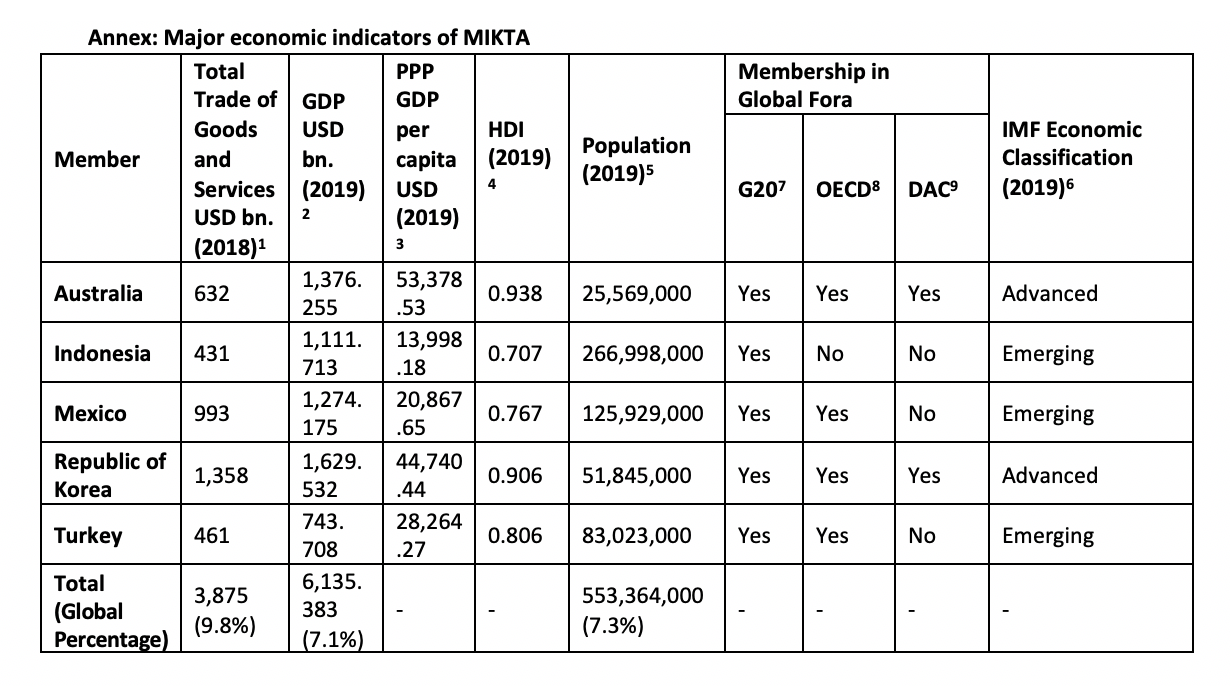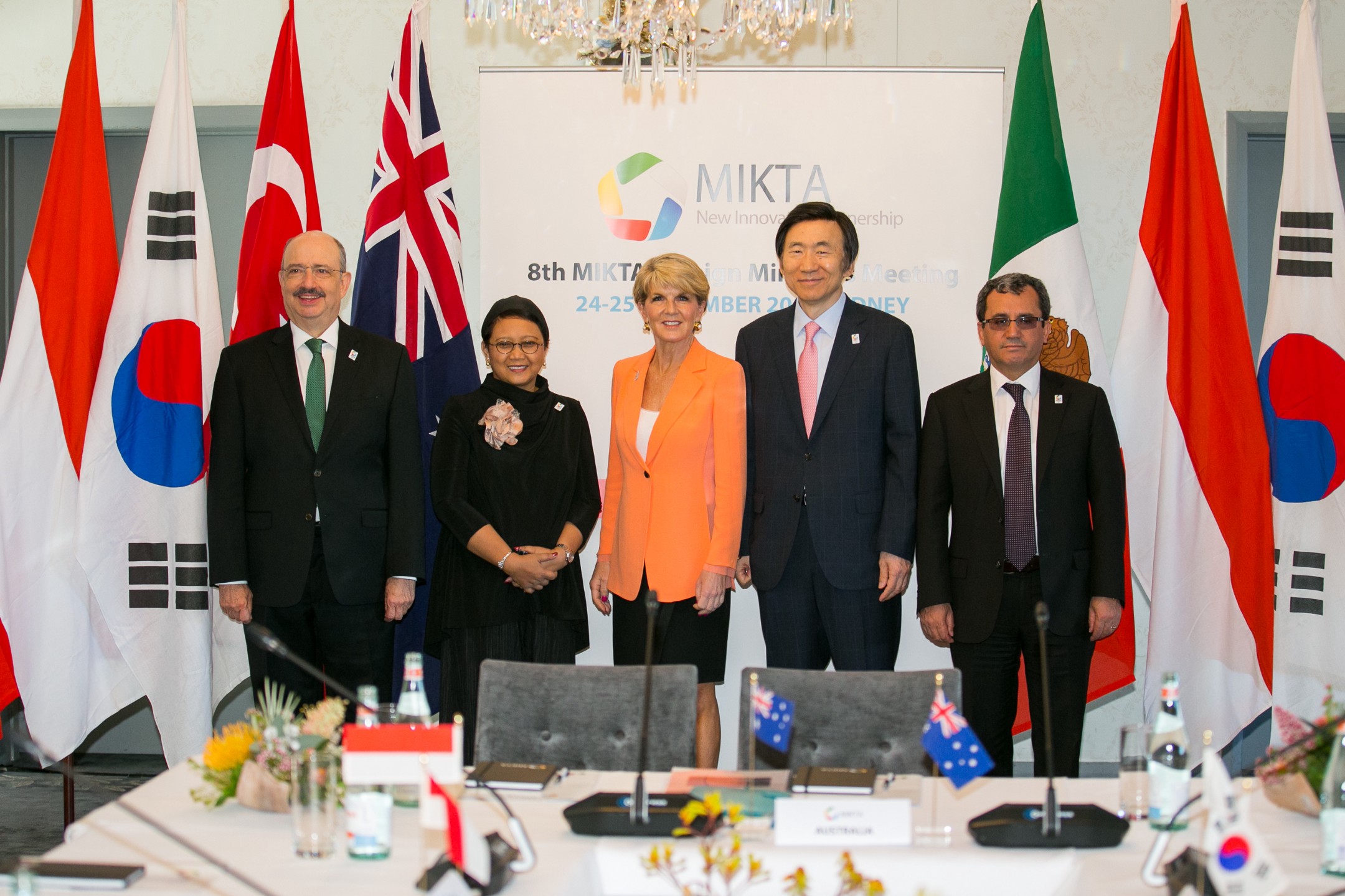Representatives of MIKTA nations meeting in Sydney in 2016: (L-R) Mexico’s Carlos de Icaza, Indonesia’s Retno Marsudi, Australia’s Julie Bishop, Republic of Korea’s Yun Byung-se, and Turkey’s Ahmet Yildiz (Photo: Department of Foreign Affairs and Trade website — www.dfat.gov.au)
The concept of ‘club governance’ is on the rise. Governments are increasingly organizing ‘clubs’ to identify joint positions and approaches towards international issues, and to push for common agendas. Often, these ‘clubs’ do not have a ‘clubhouse’ (an institutional foundation or organization), as they opt to utilize more informal and flexible platforms. Well-known examples of such clubs are the G20 (‘Group of Twenty’), the G7 (‘Group of Seven’) and the BRICS (Brazil, Russia, India, China, South Africa) group. Some ‘clubs’ already have a long tradition of cooperation (like the G7), while other ‘clubs’ were created or reformed in the last ten to fifteen years (e.g. the G20 and the BRICS). To some extent, we might see a balancing act occur between ‘clubs’ (since they are about limited memberships) and global approaches in the United Nations. If such an approach is successful, clubs might be a constructive force in support of global governance through ‘minilateralism’. This applies to a number of challenges, including consultations and joint approaches related to COVID-19.
“MIKTA” belongs to the less well-known group of “clubs” of increasing importance. MIKTA stands for the names of its five member countries: Mexico, Indonesia, the Republic of Korea, Turkey, and Australia. As an acronym, it is only known in small circles of officials and experts. So, one might ask: Do I have to remember this abbreviation? The answer: a resounding “Yes!”… because of the following reasons:
1. MIKTA is a club of middle powers — and middle powers are often perceived as crucial supporters of multilateralism. This is reflected in MIKTA’s vision statement, which outlines that, “the MIKTA countries are… like-minded on many of the global challenges of our time and are active contributors in major international forums. We have both the will and the capability to contribute to protecting public goods and strengthening global governance.”
Since middle-powers rely on effective global governance structures and a rule-based system of international cooperation, MIKTA is explicitly committed, “to the purposes and principles of the UN Charter and other universally recognized norms governing international relations.” Thus, MIKTA as a ‘club’ has, at least in theory, a clear interest in strengthening a UN-based global order.
Why is this important? MIKTA would be an especially strong and important player if its group-identity was associated with playing a pronounced role in supporting concrete multilateral strategies and activities. The ‘club’ should therefore put a strong emphasis on incorporating this multilateralist approach as a predominant part of its joint efforts.
2. MIKTA is not a group of superpowers. Nevertheless, middle-powers, specifically the MIKTA group, have the potential to significantly influence and sharpen global agendas. The total population of the five countries is well beyond 500 million people. Finally, the whole group generates almost 10% of global trade. Thus, MIKTA’s current and potential power role should neither be over- nor understated.
Why should we take note? All five MIKTA countries have a chair at the G20 table. However, given the dominance of the agendas by the G7 and BRICS countries at the G20 table there is an incentive for the remaining club members to counterbalance the dynamics.
3. MIKTA has a unique transregional characteristic and potential. The countries themselves are relevant actors; all of them play a distinct role in their respective regions and beyond their immediate neighborhood (for example, South Korea’s New Northern and New Southern Policies). For example, Turkey’s visibility in a number of African countries has increased over the last decade. Moreover, South Korea’s pronounced approach of a ‘New Southern’ and a ‘New Northern Policy’ has also indicated the expansion of its strategic outreach across Asia and the Pacific.
4. MIKTA member states are economically diverse. From the perspective of country profiles and legacies, the composition of the group seems odd to a certain extent. Two MIKTA members are regarded (by IMF classifications) as ‘advanced economies’ (Australia and South Korea), while the three others are considered to be ‘emerging economies’. Thus, bringing together a group of non-typical like-minded countries might be an advantage in terms of overcoming traditional country categories (‘developing’ vs. ‘developed’ countries).
5. Development cooperation is one of the areas where MIKTA has a lot of potential. The combination of well-established and emerging development providers (North-South and South-South cooperation models) in a rather small club format is a unique advantage. This is why MIKTA has the potential to sharpen the global development agenda. At the end of 2019, Indonesia established its own Agency for International Development (Indonesian AID). As such, all five MIKTA countries now have their own institutional development cooperation structures in place.
There was already an intention to organize a first meeting between the development cooperation agencies of MIKTA for quite some time. The ambition itself indicates that the whole group is accentuating international development debates and approaches as a means of cooperation. An inaugural consultative meeting of development cooperation agencies took place in the first half of 2020. Thus, MIKTA might play a role as a platform on development cooperation, global health and other topics in the future.
MIKTA “has achieved less than optimists envisioned, but lasted longer than pessimists imagined”, Jeffery Robertson commented recently. This seems to be a fair assessment of the first seven years of the existence of this informal middle-power club.
At the beginning of this year, a chairmanship handover meeting from Mexico to South Korea took place in New York, at the level of MIKTA missions to the United Nations. The number of minster and senior official meetings in 2020 is already exceptionally high and indicates at least a continued interest in this informal platform by its members. South Korea’s pro-multilateralism approach and its constructive role in international processes — including the collaboration on COVID-19 responses and a proactive role in sharpening the global aid architecture — could be important components for enhancing MIKTA’s role in global governance in the future.

*Sources: As captured in the footnotes, the information found above was taken from official sources such as the WTO, IMF, UNDP, G20, and OECD.
*The methodology for ‘Total Trade of Goods and Services’ is: Total Import of Merchandise + Total Export of Merchandise + Total Import of Commercial Services + Total Export of Commercial Services (Please note that an official statistic does not exist for this field. Thus, a slight margin of error may exist).
- https://www.wto.org/english/res_e/statis_e/wts2019_e/wts19_toc_e.htm
- https://www.imf.org/external/datamapper/NGDPD@WEO/OEMDC/ADVEC/WEOWORLD
- GDP per capita at Purchasing Power Parity (PPP) is the measurement of average individual income, adjusted for differences in the costs of living. https://www.imf.org/external/datamapper/NGDPDPC@WEO/OEMDC/ADVEC/WEOWORLD
- The Human Development Index (HDI) measures the key dimensions of human development: A long and healthy life, being knowledgeable, and having a decent standard of living. http://hdr.undp.org/en/content/2019-human-development-index-ranking
- https://www.imf.org/external/datamapper/LP@WEO/OEMDC/ADVEC/WEOWORLD
- http://www.oecd.org/dac/development-assistance-committee/
- https://g20.org/en/about/Pages/Participants.aspx
- https://www.oecd.org/about/document/list-oecd-member-countries.htm
- The Development Assistance Committee (DAC) is an international forum composed of many of the largest providers of aid. This group primarily monitors Official Development Assistance, sets development cooperation standards, and conducts peer reviews of member countries. http://www.oecd.org/dac/development-assistance-committee/
By Stephan Klingebiel, Director of the UNDP Seoul Policy Centre. The views expressed in this publication are those of the author and do not necessarily represent those of the United Nations, including UNDP, or the UN Member States.

 Locations
Locations




